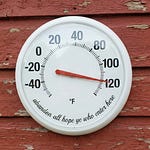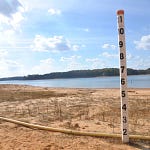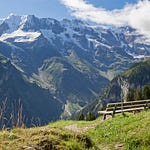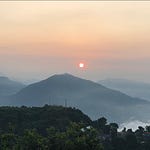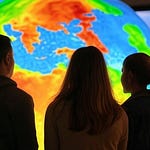
My intensive Crash Course in Personal Ruggedization begins next week.
Five, two-hour classes held via Zoom on Tuesdays and Thursdays (March 11th, 13th, 18th, 20th and 25th). A 90 minute wrap-up Q&A discussion on Thursday, March 27th. Class Times: 11:00am Pacific Standard Time (PST)
Ready to sign up? Click the button below.
Or click this link https://app.acuityscheduling.com/schedule/21f79c52/?appointmentTypeIds[]=73970428
Friends,
If you feel your compass spinning these days, you are definitely not alone.
The sheer speed of planetary change and the chaos unfolding in our politics, economy and international affairs feels wildly disorienting, even before we add this surge of disinformation, climate denial, criminality and predatory delay.
If it was hard plotting a course through the major discontinuities of climate and ecological chaos before, it can now feel completely bewildering.
But it’s never been more urgent to have your own plan, and not wait for someone official to tell you what to do.
That’s because, as I’ve said,
Collective climate action is no longer a substitute for individual climate readiness.
The crisis is here, and no society is ready. No matter what we all do together to limit the crisis, we’re each personally going to have to prepare ourselves for life in a hotter, more chaotic world.
As climate adaptation researcher Jesse Keenan sums it up, “You’re on your own.”
No one is coming to save you and your family from the escalating dangers and disruptions around you.
Even in the most-fortunate, best-governed and wealthiest communities on Earth, your family’s security and prosperity still depend on you taking responsibility for your own future.
You need a strategy for ruggedizing your life.
The mayhem we’re seeing in Washington DC and around the world only makes embracing that responsibility yourself more urgent.
These are not easy decisions to make on your own.
—
So many people are facing tough decisions on a tight timeline right now.
Does this sound familiar? You might be...
Growing more alarmed about the climate and ecological dangers around you
Relocating due to recent fires or flooding (or other climate-related impacts) and needing to quickly choose a new place to live.
Weighing if you should sell your home, and how soon.
Considering the ramifications of rebuilding in a climate-impacted location.
Feeling unsure about how to assess the pros/cons of a potential property or getting lost in risk maps and climate ratings.
Wishing you had a coherent, expert framework for assessing relative safety when considering a move, whether you're moving across town or to a different country.
Helping others navigate these kinds of complex choices, as a real estate agent, investment advisor, consultant, therapist, teacher or coach, and wanting to better serve them.
Wanting to learn in a group of thoughtful people who take these issues as seriously as you do.
In this crisis, speed is everything.
The planetary crisis is worsening fast, climate costs are rising, and competition for homes in relatively safe communities is increasing.
Well, my six-session A Crash Course in Personal Ruggedization works fast. It delivers concentrated insights, real-world examples, select readings, and discussions to give participants a strong foundation for making clear-headed choices in discontinuous times.
I don’t give simple answers to what are deeply complex problems, but I do equip you to make better decisions.
—
The next Crash Course starts a week from today.
Five, two-hour classes held on Tuesdays and Thursdays (March 11th, 13th, 18th, 20th and 25th). A 90 minute wrap-up discussion on Thursday, March 27th. Class Times: 11:00am Pacific Standard Time (PST) (Classes will be recorded, and recordings will be sent following each class.
The deadline is midnight, this Sunday, March 9th. click this link to sign up:
https://app.acuityscheduling.com/schedule/21f79c52/?appointmentTypeIds[]=73970428
—
In this crash course, we’ll cover five main topics:
MAKING SENSE OF A COMPLEX CRISIS
Climate chaos means the world no longer works the way it used to, and things are getting stranger by the day. How do we understand this crisis? How it is discontinuous with the expectations we were raised to have? How bad could it get? What are we preparing for?
SCOUTING FOR RELATIVE SAFETY
Place is the prime pivot point of all climate strategy. How do we judge regions and assess their risks? What are the major risks to look out for, and how do we measure them for any given region? What is relative safety, and where can we find it? Should we move across the world, or across town — or dig in where we are?
FINDING (OR BUILDING) COMMUNITIES THAT WORK IN TURBULENT TIMES
In any given area, some communities will respond in ways that help their citizens thrive, and some will fail. What is climate brittleness and why is it so dangerous to our prospects? How do we evaluate cities and local efforts? What are some of the indicators of places that are being built and governed to be more rugged in the face of climate chaos? How do we buffer against political upheaval?
MAKING A HOME THAT CAN WEATHER THE STORM
How do we pick a specific place to build our future? What should we look for in a home, a neighborhood and a community? What are the costs and benefits of urban, suburban and exurban lives? How do we move quickly enough to outpace the coming climate-driven housing bottleneck? What are the opportunities and perils of relocation in politically turbulent times? Why might the best-sited and best-run places see boom times in the coming decades?
CLIMATE-PROOFING OUR LIVES AND FAMILIES
How do we start building a rugged life, in all parts of life? What’s most important to us as people as we build our personal climate strategy? How do we align our family and household, career and investments, citizenship and ethics to new realities? How might we talk with our family, friends, neighbors and colleagues to include them in our planning? How do we make this crisis into an opportunity for deeper connection and purpose?
By the end of March, it is our goal to help you feel more confident in:
Making clear decisions in the face of unprecedented planetary discontinuities;
Assessing climate risks and trends (present and future);
Planning your family's climate strategy (where to live, how to ruggedize your life, and how to bring climate foresight into the wide range of decisions this crisis is influencing);
Feeling more grounded, more at home in the present and ready for the future.
It’s getting pretty damn real out there, folks, but 2025 can be the year you make yourself ready for what’s on its way.
In the last five years, I’ve taught more than a dozen courses, with more than 400 participants, and had hundreds of other one-on-one conversations with folks about their plans for responding to climate discontinuity in their own lives. I’ve built a course that reflects everything I’ve learned in the process.
Questions? Here are some of the ones we get asked the most:
1) Is this course designed for people outside of the U.S., too?
Yes! While most of the examples and maps are from a U.S. context, I have traveled extensively for years, and can toggle contexts easily. The most important insights are universal.
2) What if I'm most interested in ruggedizing my business? Will this course help?
To make smarter personal choices in the face of the climate crisis, we learn to see (and anticipate changes in) the interconnected systems around us. Those same insights can also help us make better decisions in business and investing.
3) I can't make all the classes, are they recorded?
Every call is recorded and shared with the participants. Live attendance is not mandatory (though it is encouraged).
4) Will this course detail specific places that are safer to live?
Much of this class is about choosing safer places to relocate to. I don't recommend specific places (in part because each person has their own needs), but I provide a straight-forward framework for choosing a place to go and discuss the pros and cons of certain areas. A number of past participants have found this criteria clear enough to pick safer homes and relocate (including two participants who relocated out of the path of the LA fires before those wildfire struck).
5) How much interaction is there? How much access will I have to Alex?
We do 30 minutes or so of group discussion at the end of every class, and there is a 90 minute group Q&A wrap up call at the end. I am available to answer questions (and for deep-discount coaching calls) during and after the course. If you want more guidance, we can arrange one-on-one calls to follow up.
6) Do I have to be a climate expert or work in a climate job for this to make sense?
Though many participants work in climate-related fields and businesses, the course starts from the basics and builds systemic understanding from there. No special knowledge is needed to benefit, and a list of resources for further learning is provided.
7) What if I decide this course isn’t right for me?
We want you to have a great experience. We also value your investment of time and resources. If, after the first live call, you truly believe that the course is not right for you, you have until Thursday, March 13 at 10:00am PST to request a 90% refund.
Ready to sign up? Click the button below.
Or click this link https://app.acuityscheduling.com/schedule/21f79c52/?appointmentTypeIds[]=73970428
Testimonials:
“For anyone interested in personally preparing yourself and your family for climate change impacts, boy do I have a great recommendation for you… one of the most impactful learning experiences I’ve had on any topic in the last decade.
All you have to believe is that the future is likely to be more risky and uncertain, whether from climate change or just natural disasters, political instability, social unrest, armed conflict, economic or supply chain disruption, etc.
Heck, you could completely disbelieve climate change is happening at all, and this course would still be transformational because its focus is on preparing you and your family and community for a wide range of potential scenarios, whatever those might be. [Alex] completely dismantles typical “prepper” advice, showing how fundamentally misguided it is for almost any future scenario (the actual best way to prepare is completely counter-intuitive).
Most of all, the students and community that are part of Steffen’s courses are simply phenomenal. Thoughtful, wise, accomplished but also empathetic people, many of whom are playing active roles in shaping policy, economics, planning, and business.
Alex addresses a remarkable range of holistic topics, from the all-important choice of where to locate yourself, to the psychological mindset shifts needed, to basic provisioning and preparing for utility interruption, to adapting your career, finances, and business for likely future changes.
I ‘10 out of 10’ recommend it.”
Tiago Forte, Forte Labs, participant
*
“The best way to get smart about how to live through the cascading climate chaos of our time is to always read Alex Steffen.”
Jeff Goodell, Author of The Heat Will Kill You First
*
“When all the others are just talking about what systems-collapse or planetary crisis look like, Alex's work already gives you a framework on how to navigate it with confidence and with the clear possibility of creating a thriving and hardened future for you, your loved ones, and the communities you serve.”
Justin D'Atri, Group Sustainability Transformation Lead, Zurich Insurance Group, Participant
*
“I've worried for a long time about what I can do about the climate crisis, and how to prepare. Several years ago, I began reading Alex Steffen's work and for the first time felt some understanding about what is going on in the political sphere around climate change and the predatory delay of business people and politicians. I also became inspired by Alex's aspirational imaginings about how we might transform life in our cities to be more beautiful, sustainable, and enjoyable.
I was intrigued when I saw Alex's Crash Course offering for personal ruggedization. At first my partner and I weren't sure if the cost of time and money would be worth it for our family. But then Alex sent an email headlined, “The Crisis Doesn't Care,” and that was it. We had experienced that truth, through the pandemic and our housing situations. We knew keenly how it felt to be left behind. The crises hadn't cared, and neither had elected officials, or the business people profiting from our hardships. We needed to be informed and prepared for navigating this unfolding era of climate change, and Alex's Crash Course was an incredible foundation.
Through Alex's course, my partner and I gained invaluable insight about what's going on and how to evaluate which factors are most important for our family as we navigate these difficult changes. We also felt excited and empowered to take action. Alex shared illustrative examples of places around the world where people are taking the climate crisis as an opportunity to greatly improve quality of life.
Thanks to Alex's course, our family took decisive action and moved to a new city. We love our new home. We've jumped right in to work alongside our neighbors who are already ruggedizing the city. There's much to do. We are so grateful that Alex helped us quickly identify the important factors to consider and set us on a path for being better prepared to care for ourselves, our neighbors and all in our city and wider region. Alex Steffen's Crash Course in Personal Ruggedization was life-changing for us, and absolutely worth our investment of money and time.”
Maia, participant
*
“Alex has been thinking about the impacts of climate change longer than most people. Through the Crash Course in Personal Ruggedization, Alex provides insight to the more likely future scenarios and helps attendees position themselves, physically and mentally, to avoid the worst impacts and take advantage of the opportunities that are created. It is a very thought-provoking course and also provides the opportunity to network with like minded people around the globe. Highly recommended.”
Jeff Roulston, participant




